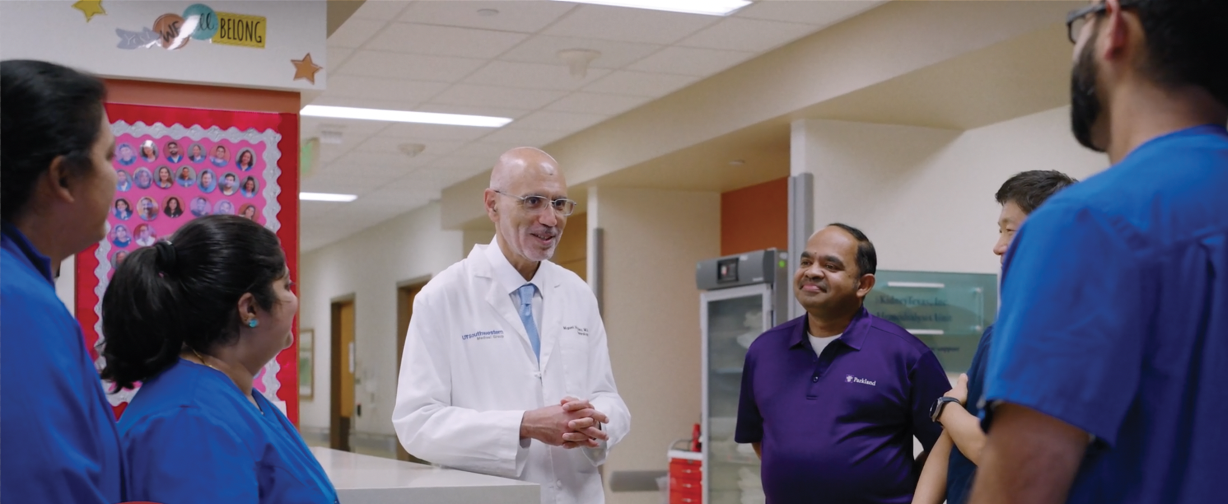
4 minute read
A Comprehensive Approach to Improving Patient Care
UTSW scientists are implementing studies to provide clinicians with evidence-based strategies to enhance patient care.
Discovering the most effective ways to treat patients with multiple chronic conditions is a critical yet challenging goal for clinicians, who often face barriers to providing therapies based on clinical guidelines. At UT Southwestern, a wealth of clinical resources and research infrastructure has helped build a foundation for the development of treatments that are decreasing hospitalizations and saving lives.
“That’s one of the advantages of UT Southwestern – this is a special place where there is a significant amount of trust across different health systems, which facilitates important research and clinical collaborations,” says Miguel Vazquez, M.D., Professor of Internal Medicine and Clinical Director of the Division of Nephrology. “When it comes to research that’s ultimate goal is to find effective therapies for our patients, we can answer the really big questions.”
Orchestrating a Massive Multi-Center Trial
One area of focus in Dr. Vazquez’s research has been investigating how to support physicians with the latest technology as they care for their patients. In a recently published national study in The New England Journal of Medicine, he and his colleagues revealed a robust model for testing the efficacy of interventions for chronic health conditions.
The research team designed a large-scale pragmatic trial testing the effectiveness of guideline-directed therapies for patients with the kidney-dysfunction triad of co-occurring chronic kidney disease, Type 2 diabetes, and hypertension. Therapies can help patients control their disorders, but Dr. Vazquez was unsure if patients were consistently receiving them, or how to best administer them.
The team tested whether having additional personnel to support practitioners by delivering guideline-directed therapies would improve patient health. They leaned on UT Southwestern’s robust connections with partner institutions in the DallasFort Worth area, including Parkland Health, Texas Health Resources, and the VA North Texas Health Care System, enrolling 11,000 adults from diverse racial and socioeconomic backgrounds at 141 primary care practices.
“When patients want to know which treatments are best, we need to have a way to test that,” says Dr. Vazquez, who is also Chief of Nephrology at Parkland Memorial Hospital.
Valuable Lessons
Dr. Vazquez collaborated with experts in informatics, electronic health records, computer software, data management, and institutional leadership, including Robert Toto, M.D., Professor of Internal Medicine, Associate Dean for Clinical and Translational Research, and co-leader of the study.
The researchers used a computerized algorithm to analyze patients’ electronic health records and uncover cases of undiagnosed kidney disease, and randomly selected patients to receive therapies from support staff in addition to their doctors during appointments. The findings revealed that these interventions led to only modest differences in patient care at one year. However, the study provided valuable lessons on how to enhance collaboration across diverse settings, health conditions, and patient populations, and will serve as a model for future studies to improve care for patients.
Eric Peterson, M.D., M.P.H., Vice Provost and Senior Associate Dean for Clinical Research, says it’s important to prioritize the infrastructure needed to improve clinician and patient adoption of proven therapies.
“Despite advances in medicine, clinicians do not always deliver consistent treatment,” Dr. Peterson says. “It’s vital to rigorously evaluate whether treatments are effective in the real world. UT Southwestern has developed mechanisms to support researchers in conducting trials of this scale, from training younger scholars and pairing them with experienced investigators to providing tools and resources.”
Saad Omer, M.B.B.S., M.P.H., Ph.D., Dean of the Peter O’Donnell Jr. School of Public Health, notes that the study’s implications go beyond clinical care.
“The trial was very much in line with the public health paradigm of research to improve people’s lives,” Dr. Omer says. “This kind of high-quality science is generalizable to broader populations and has the potential to impact public health and clinical guidelines.”
On the Horizon
Future research directions include analyzing electronic health records to identify patients who need therapies but aren’t receiving them, and training health care providers to support doctors. Dr. Vazquez, in collaboration with Wanpen Vongpatanasin, M.D., Professor of Internal Medicine and Director of the Hypertension Section in the Division of Cardiology, is currently conducting a large-scale pragmatic trial to determine whether lowering blood pressure can reduce cognitive decline.
“It’s an incredible privilege to be the beneficiaries of our patients’ trust,” Dr. Vazquez says. “It’s our responsibility to care for them and advance knowledge about the best treatments. We are so fortunate to work with patients who want to help us learn more.”
Saad Omer, M.B.B.S., M.P.H., Ph.D., Dean of the O’Donnell School of Public Health
Eric Peterson, M.D., M.P.H., Vice Provost and Senior Associate Dean for Clinical Research
Robert Toto, M.D., Professor of Internal Medicine and Associate Dean for Clinical and Translational Research
Miguel Vazquez, M.D., Professor of Internal Medicine and Clinical Director of the Division of Nephrology
Wanpen Vongpatanasin, M.D., Professor of Internal Medicine and Director of the Hypertension Section in the Division of Cardiology

